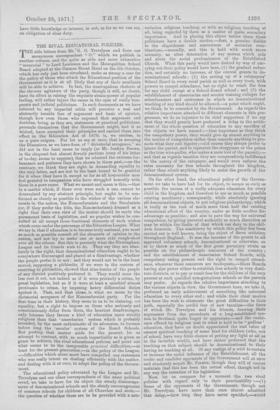TOPICS OF THE DAY.
THE FAMINE IN PERSIA.
WE greatly doubt whether the people of this country, even those who have noticed the statements upon the subject, have any idea of the present state of affairs in Persia. Sir Henry Rawlinson has told them something, but he was obviously afraid of overcharging his picture, and alienating sympathy by apparent exaggeration. Knowing Persia, too, he was, we imagine from his speech at the Mansion House, entirely unaware of a curious difficulty in his way, an intel- lectual severance between his knowledge and that of his audience. He thinks of Persia as an immense country of mountain, and desert, and prairie, unirrigated by man and insufficiently watered by nature ; with comparatively few trees and no deltas defended from drought as it were by Heaven, full of vast arid plains which with water would yield like Lin- colnshire, but without it are about as culturable as the Place de la Concorde ; the whole occupied by about two millions of a brave and intellectual, but idle and vicious, race of artisans and culti- vators, far below the Neapolitans whom of all Europeans they most resemble,—Mohammedans penetrated at once with fatalism and with that dreadful Safes infidelity, the infidelity which, recognizing alike God and good, holds that neither has any moral obligation ; and with about two millions of pastoral nomads, socially on a level with the Bedouins, morally, we believe, below them. To most of Sir Henry's audience at the Mansion House, on the contrary, the word " Persia " calls up the idea of a grand Oriental Empire, full of semi-civilized people and of wealth, with a Government despotic and oppressive perhaps, but energetic, efficient, and full of resources, a Government in all but probity not unlike that of India. In reality, the feeble, scat- tered, and decaying population of weary voluptuaries, cowed pea- sants, and savage herdsmen is ruled by perhaps the worst Govern- ment, the one most inefficient for good, which ever afflicted mankind,—by a clan of despotic satraps, who, because they are kinsmen of the Royal House, are exempt even from the ordi- nary Asiatic check on misgovernment,—assassination by an indignant monarch or an outraged mob. There will come no help from them, even if they could give any ; and if Persia has really been struck, as now seems certain, by that most horrible of scourges, a culminating famine, a famine increas- ing through three successive years, a famine like that of Orissa, or of Rajpootana, or the Great Famine of North India, a famine of forage as well as cereals, words will not suffice to describe the extent of a calamity which, if it lasts another year—and the time has passed for rain—may almost blot Persia out of the nations, finally paralyze her for resistance to the power always closing round her throat. Sir Henry Raw- linson states only what he knows, but what he states with reserve when carefully read indicates a calamity worse than that which crushed Orissa.
The Eelyat or Bedouin tribes who make up so large a portion of the population of Persia, a population smaller than that of Belgium, and more scattered and isolated in many districts than that of Northern Sweden, have been fighting for three years against continuous drought, until at last forage is unprocurable, and their stock has perished. It is difficult to imagine under such circumstances how they could be saved, even if the Persian Government were as strong as that of India. The clans cannot help each other, for all are stricken alike. They cannot march to more fertile pastures, for the drought has desolated the whole pastoral country, and if they wander beyond it they will be treated as enemies, even if there exist means to feed them beyond the frontier. Besides, their means of locomotion—that is, of travelling hundreds of miles through dried-up plains—must have failed them, and the only course visible to themselves will be to practise the resigna- tion which in extreme moments never fails a Mohammedan, to live on less than will keep them alive, and await calmly either relief or death. They are doing this in known places, and what their fate must be in the encampments whence news never reaches Europe or even India, in the more arid plains and the dry valleys in the hills, it is ghastly even to conjecture. Help, if it comes at all, must come from without, and as Sir Henry Rawlinson hinted, that help is humanly speaking nearly impossible. The Indian Government, with its wealth and organization, if stirred to a desperate effort, an effort like that required for the invasion of 1856-57, might save the tribes near the coast ; but the Indian Government is not responsible for Persia, is overburdened, and would be utterly distrusted by the statesmen of Teheran. These statesmen can do almost nothing. Money is worthless even if they had it, and they have no supplies to send. They have no granaries stored for years such as the Indian Princes used to keep before communication improved, no means of transport such as nature and the British conquerors have provided for India. They have no storehouse like Bengal, where the only danger is flood, where when the rest of the continent is frying for want of water the rice accumulates till the granaries burst. The conveyance of forage to the dying Bedouins is simply impossible, for the pack animals, marching through blighted provinces, would eat more than they could carry, and except beasts of burden there are no means of conveyance. There are no roads, no rivers, no railways, no canals, no means of transporting caravans of food'. An Eelyaut encampment with its horses dead must be like an encampment in a ruined planet, isolated from the help of all sentient beings. The "cities " might ray out supplies to, certain limited distances ; but, with one exception, a city in Persia is a collection of houses tenanted by people with less- power to help than one of our large northern villages would in extremity exhibit, with one year's store of grain at most and no accumulated wealth whatever. Besides, the famine must have extended to the cities. The inhabitants of the plains within any possible marching distance will of course have poured into them, and the worst stories of suffering come from them, from Teheran, and Tabreez, and Bushire, the last the richest- and most accessible place in Persia. If the people in Bushire are dying daily ; if in Ispahan, under the shadow of the Court, 12,000 are known to have perished ; if in Kazeroon out of 10,000 people only 2,000 remain,—and all these statements can be surpassed from the official records of Orissa,—there is visibly no help to be hoped for from within. Persia itself. The Persian Minister, as in duty bound, says the Shah gives all he can ; but though, we dare say, he orders food and is plundered to pay for it, sympathy is an undeveloped virtue in the East, and the officials will accept the famine as they would a flood, and think they have done much when they have remitted the State taxes. The famine, moreover, is not at an end. Not a hint is given in any of the speeches of Wednesday, not even in the optimist one uttered by the Minister, of any proximate diminution of distress, nor do we perceive any immediate or indeed approaching reason for hope. The forage may revive next year, but it will be three before the flocks and herds can be renewed, and one before much grain can be ready for consumption. For months- everything must be imported, and as there is nothing to export in return, no hoarded wealth and no means of trans- port on any adequate scale, the future looks black indeed. Whether Sir Henry Rawlinson used the phrase " a doomed country " advisedly we do not know, but that phrase con- veys exactly the apprehension which the recent history of Persia and the suggestions as to this famine leave upon our minds. A Government bad and effete, but too strong to be shaken off, cities ruined by tyranny and taxation, a people declining in number, and a soil devastated by droughts, Persia seems to us to be a great and a tempting prey to any power with the inclination to terminate her independence. The Londoners can help the population of Bushire if they like, and even of Ispahan, and we certainly shall not dissuade them. But the calamity appears to our oyes too great to be relieved or even ameliorated by any subscription the Lord Mayor is likely to collect. If it is our duty to save the Persian Bedouins, it is on the Duke of Argyle and the Council of India,. and not on the Londoners, that the moral responsibility must rest. They can do the work if they choose, and nobody else can. If the Duke pleases to order the effort and the Council to sanction the expenditure, they can throw limitless stores of food and sufficient commissariat officers and carts into Bushire to save the lives of all the Bedouins in the South who can move at all ; can rescue fifty or five hundred times the number of persons who can be saved by any other organization. That, as we say, they can do it is certain ; but the attempt involves. a serious effort, and after much thinking we cannot be certain as to the moral obligation. The Indian Government cannot take upon itself the woes of all Asia ; and it has no relation to the people of Persia except one of jealous and unwearying watchfulness over the proceedings of a very ambitious Court, which has once or twice been dangerously hostile. If the people could be consulted all would be easy, but to tax natives
i
equally liable to famine to relieve famine in a country with, which they have little or no connection, and about which they
have little knowledge or interest, is not, as far as we can see, an obligation of clear duty.



































 Previous page
Previous page